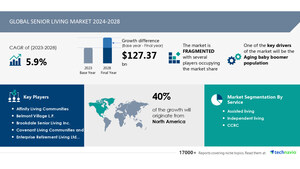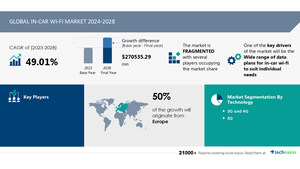NEW YORK, Nov. 12, 2024 /PRNewswire/ -- Report with the AI impact on market trends - The global wound care market size is estimated to grow by USD 6.95 billion from 2024-2028, according to Technavio. The market is estimated to grow at a CAGR of 5.8% during the forecast period. Increasing prevalence of acute and chronic wounds is driving market growth, with a trend towards increasing demand for combination wound dressings. However, high cost of wound treatments and advanced wound care products poses a challenge.Key market players include 3M Co., Advancis Medical, Avery Dennison Corp., Axio Biosolutions Pvt. Ltd., Azelis SA, B.Braun SE, Cardinal Health Inc., Coloplast AS, ConvaTec Group Plc, Galaxy Medicare Ltd., Harro Hofliger GmbH, Johnson and Johnson Services Inc., Medline Industries LP, Medtronic PLC, Molnlycke Health Care AB, Organogenesis Holdings Inc., Paul Hartmann AG, Resonetics, Smith and Nephew plc, and URGO Group.
AI-Powered Market Evolution Insights. Our comprehensive market report ready with the latest trends, growth opportunities, and strategic analysis- View Free Sample Report PDF
Forecast period |
2024-2028 |
Base Year |
2023 |
Historic Data |
2018 - 2022 |
Segment Covered |
Product (Advanced wound dressings, Surgical wound care, and Traditional wound care), Application (Chronic wound and Acute wound), and Geography (North America, Europe, Asia, and Rest of World (ROW)) |
Region Covered |
North America, Europe, Asia, and Rest of World (ROW) |
Key companies profiled |
3M Co., Advancis Medical, Avery Dennison Corp., Axio Biosolutions Pvt. Ltd., Azelis SA, B.Braun SE, Cardinal Health Inc., Coloplast AS, ConvaTec Group Plc, Galaxy Medicare Ltd., Harro Hofliger GmbH, Johnson and Johnson Services Inc., Medline Industries LP, Medtronic PLC, Molnlycke Health Care AB, Organogenesis Holdings Inc., Paul Hartmann AG, Resonetics, Smith and Nephew plc, and URGO Group |
Key Market Trends Fueling Growth
The Wound Care Market is experiencing significant growth due to trends in regenerative medicine and advanced products. Dressings and devices, including biological skin substitutes, are in high demand for chronic diseases and surgical procedures. High medical expenditures and accessibility issues drive the need for cost-effective solutions. Awareness and healthcare education are essential for advanced wound care, especially in acute and traumatic wounds. Companies like Cardinal Health are innovating with smart dressings, bioengineered tissues, and digital wound monitoring. Sustainability is a focus with biodegradable materials and home healthcare. Reimbursements and patient outcomes are crucial for chronic wounds, affecting the geriatric population and diabetic foot ulcers. Obesity, cardiovascular ailments, and venous leg ulcers require specialized care, emphasizing the importance of timely intervention and infection prevention. Traditional wound care faces competition from surgical site infections, burn injuries, and traumatic injuries treated in Ambulatory Surgical Centers. The financial impact of chronic wounds is significant, with diabetes prevalence and sedentary lifestyles contributing to non-traumatic amputations.
The global wound care market is witnessing significant growth due to the increasing popularity of antimicrobial agents in advanced wound dressings. Silver, iodine, and honey are commonly used antimicrobial agents that enhance the effectiveness of wound treatment. These dressings offer multiple advanced properties, such as absorption, adhesion, and protection from bacteria. They are suitable for both partial and full-thickness wounds and are convenient to use. End-users prefer combination dressings due to their availability and ease of application. These dressings combine distinct components into a single dressing, providing multiple functions and improving overall wound care outcomes.
Insights on how AI is driving innovation, efficiency, and market growth- Request Sample!
Market Challenges
- The Wound Care Market faces several challenges in providing effective solutions for various types of wounds. Regenerative medicine and advanced products, including dressings and devices, offer promising solutions for chronic diseases and surgical procedures. However, high costs and accessibility remain significant barriers, especially for biological skin substitutes. Medical expenditures continue to rise due to the increasing prevalence of chronic diseases, such as diabetes and obesity, leading to complications like diabetic foot ulcers and non-traumatic amputations. Traditional wound care methods, like hydrocolloid dressings, focus on moisture retention, but advanced wound care, such as smart dressings and bioengineered tissues, offer digital wound monitoring and environmental sustainability using biodegradable materials. Timely intervention and infection prevention are crucial for patient outcomes, especially in surgical cases. Reimbursements for advanced wound care remain a concern, as does the financial impact of chronic wounds on healthcare systems. Healthcare education and awareness are essential to improving skin prevention and proper wound care application. Specialty clinics and Ambulatory Surgical Centers cater to the needs of specific patient populations, such as the geriatric population and those with venous leg ulcers. The market must address these challenges to improve patient outcomes and reduce complications, including surgical site infections and burn injuries.
- The global wound care market faces growth challenges due to the high cost of advanced care products. In the US alone, annual expenditure on wound care ranges from USD45-55 billion. Advanced dressings, such as foam, alginate, hydrogel, hydrocolloid, and wound contact materials, are expensive. For instance, the material cost per change for Smith & Nephew ALLEVYN Foam Dressing is around USD9.83, and the nursing cost per dressing change is approximately USD9.18. Frequent dressing changes are necessary for most patients, with alginate dressings requiring changes every 2-3 days, foam dressings every 3-4 days, hydrogel dressings every 1-2 days, hydrocolloid dressings every 3-4 days, and wound contact materials every 4-7 days. These costs add up significantly, potentially limiting market growth.
Insights into how AI is reshaping industries and driving growth- Download a Sample Report
Segment Overview
This wound care market report extensively covers market segmentation by
- Product
- 1.1 Advanced wound dressings
- 1.2 Surgical wound care
- 1.3 Traditional wound care
- Application
- 2.1 Chronic wound
- 2.2 Acute wound
- Geography
- 3.1 North America
- 3.2 Europe
- 3.3 Asia
- 3.4 Rest of World (ROW)
1.1 Advanced wound dressings- The advanced wound dressings segment, which includes moist wound dressings and antimicrobial wound dressings, dominates the global wound care market due to their increasing adoption for treating complex wounds. These advanced dressings offer benefits such as promoting faster wound healing, reducing infection risks, and providing protection from external factors. Hospitals and ambulatory surgical centers (ASCs) are significant end-users of these dressings due to their cost-effectiveness and ease of use. Moist wound dressings maintain a hydrated environment around the wound site, ensuring oxygen flow and removing dead tissue, while antimicrobial wound dressings prevent bacterial growth and multiplication. The market's growth is driven by the rising incidence of chronic wounds and burns, an aging population, and increased awareness about advanced wound dressings. Despite intense competition and high costs, the segment is expected to grow rapidly due to the large number of key vendors, the preference for minimal invasive procedures, and the increasing adoption of antimicrobial dressings. In the UK, primary care prescriptions for moist and antimicrobial dressings amount to over USD135 million annually, with over USD20 million spent on silver dressings. Vendors are forming partnerships with healthcare institutions to supply their advanced wound dressings, further boosting market growth.
Download complimentary Sample Report to gain insights into AI's impact on market dynamics, emerging trends, and future opportunities- including forecast (2024-2028) and historic data (2018 - 2022)
Research Analysis
The Wound Care Market encompasses advanced products and technologies, including regenerative medicine, biological skin substitutes, dressings, and devices, designed to promote wound healing and manage chronic diseases such as diabetes. These innovative solutions offer significant benefits over traditional methods, addressing challenges like high costs, accessibility, and awareness. Advanced wound care includes surgical wound care, hydrocolloid dressings, and smart dressings, which offer superior moisture retention and infection prevention. Chronic conditions like diabetes, sedentary lifestyle, and non-traumatic amputations contribute to the market's growth. Surgical procedures, cardinal health expenditures, and healthcare education play a crucial role in driving demand for these advanced solutions. Wound care products cater to various types of wounds, including acute, traumatic, surgical site infections, burn injuries, and diabetic foot ulcers. Ambulatory Surgical Centers and healthcare facilities increasingly adopt these advanced technologies to improve patient outcomes and reduce hospital readmissions. The market faces challenges due to high costs, accessibility, and the need for continued awareness and education. Key areas of focus include developing cost-effective solutions, expanding accessibility, and increasing awareness through targeted marketing and healthcare education initiatives. The future of wound care lies in continuous innovation and the integration of technology to provide personalized, effective, and affordable solutions for patients.
Market Research Overview
The Wound Care Market is experiencing significant growth due to the increasing prevalence of chronic diseases such as diabetes and obesity, leading to an increase in acute and chronic wounds. Advanced products, including regenerative medicine, biological skin substitutes, and smart dressings, are gaining popularity in wound care. These advanced products offer moisture management, infection prevention, and digital monitoring capabilities. Traditional wound care methods, such as hydrocolloid dressings and classic wound care, continue to be used in various settings, including hospitals, clinics, and ambulatory surgical centers. Surgical procedures, traumatic injuries, and burn injuries also require specialized wound care. Complications, such as surgical site infections, can lead to high medical expenditures and reimbursement challenges. Timely intervention and patient outcomes are crucial in managing these complex wounds. The geriatric population is particularly vulnerable to chronic wounds, which can have a significant financial impact on healthcare systems. Environmental sustainability is also a growing concern in wound care, with the use of biodegradable materials and eco-friendly practices becoming increasingly important. Telemedicine and home healthcare are also gaining popularity in wound care, offering greater accessibility and convenience for patients. Infection prevention and skin prevention are essential aspects of wound care education and awareness. The healthcare industry continues to invest in advanced wound care technologies to improve patient outcomes and reduce the burden of chronic wounds.
Table of Contents:
1 Executive Summary
2 Market Landscape
3 Market Sizing
4 Historic Market Size
5 Five Forces Analysis
6 Market Segmentation
- Product
- Advanced Wound Dressings
- Surgical Wound Care
- Traditional Wound Care
- Application
- Chronic Wound
- Acute Wound
- Geography
- North America
- Europe
- Asia
- Rest Of World (ROW)
7 Customer Landscape
8 Geographic Landscape
9 Drivers, Challenges, and Trends
10 Company Landscape
11 Company Analysis
12 Appendix
About Technavio
Technavio is a leading global technology research and advisory company. Their research and analysis focuses on emerging market trends and provides actionable insights to help businesses identify market opportunities and develop effective strategies to optimize their market positions.
With over 500 specialized analysts, Technavio's report library consists of more than 17,000 reports and counting, covering 800 technologies, spanning across 50 countries. Their client base consists of enterprises of all sizes, including more than 100 Fortune 500 companies. This growing client base relies on Technavio's comprehensive coverage, extensive research, and actionable market insights to identify opportunities in existing and potential markets and assess their competitive positions within changing market scenarios.
Contacts
Technavio Research
Jesse Maida
Media & Marketing Executive
US: +1 844 364 1100
UK: +44 203 893 3200
Email: [email protected]
Website: www.technavio.com/
SOURCE Technavio

WANT YOUR COMPANY'S NEWS FEATURED ON PRNEWSWIRE.COM?
Newsrooms &
Influencers
Digital Media
Outlets
Journalists
Opted In





Share this article